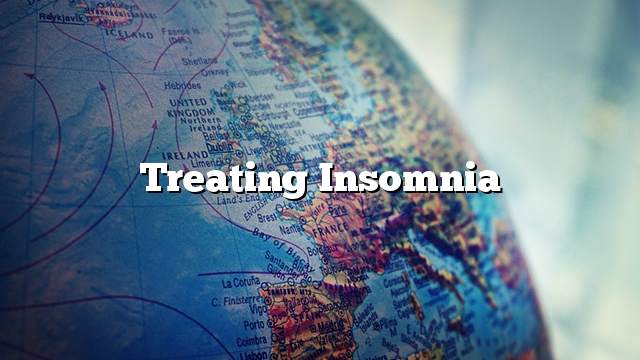Insomnia
Insomnia Insomnia is a sleep disturbance that leads to a person’s inability to start sleeping, or a person’s inability to survive and to sleep, resulting in either very few hours of sleep or a disturbed sleep. Acute insomnia may be a short term and is a common problem, such as stress, family problems, etc. It can last for days or weeks, and insomnia may be chronic and chronic. insomnia), which lasts for one month or more, and most chronic insomnia are secondary, ie, a symptom or side effect of another health problem, certain drugs, or others. But insomnia may also be primary; Or a particular medicine. So far, the cause of primary insomnia has not been fully understood, but some causes may be triggered, such as stress for a long time, and emotional disorders, for example.
Treating insomnia
It is possible to treat insomnia in more than one way as follows:
Drugs without prescription
Some of the over-the-counter medications used to treat insomnia are listed below:
- Antihistamines are the most common, but they can cause side effects such as feeling calm and sluggishness during the day, dizziness, poor movement, dry mouth, confusion in vision, constipation, weight gain, and urine retention. The body may quickly become accustomed to certain medications, such as diphenhydramine, which usually occurs within three days.
- Melatonin is a hormone secreted from the pineal gland. The peak time for its natural secretion is between 2 am and 4 pm, and it drops before dawn and is less secretive. It is more effective for the treatment of insomnia in older people. Because of its ability to influence the harmony of the biological clock in the body, it is effective for the treatment of sleep disorders, and is present in the form of dietary supplements. The effectiveness of melatonin in people with insomnia may depend on the composition and dosage of the drug, the timing and frequency of treatment, and the duration of treatment.
- Tryptophan (L-tryptophan) is used to improve sleep in people with insomnia, although there is little research to prove its effectiveness.
Medications
Some prescription drugs, such as Isopiclone, Ramelteon, Zaleplon, and Zolpidem, may be used as the first choice for treating insomnia. Short duration. Orexin receptor antagonists (Orexin receptor antagonists) are also used to inhibit the work of certain chemicals in the brain that keep the person awake. Therefore, these drugs stimulate and improve sleep, and benzodiazepines are used to help start Sleep or persistent sleep, as well as antidepressants with a calming effect.
Other drugs are used but not officially approved, including Gabapentin, a drug used to treat chronic pain, and has been studied for use in some sleep disorders such as restless legs syndrome, Improved sleep, increased sleep time and effectiveness, and other results. One of these drugs is also Tiagabine, an anticonvulsant, and its effect on sleep was studied at a dose of 4-16 milligrams, which is much lower than the dose used to treat epilepsy.
Herbal Therapy
Some herbs, such as Valerian root, chamomile, Primrose, and Passion flower, may be used, but there is insufficient scientific evidence to prove its efficacy and safety.
It is important to note that some people use alcohol to help them sleep. This is wrong and should be avoided. Alcohol initially causes sleepiness and helps to start sleeping; it increases the possibility of waking up at night and the difficulty of going back to sleep. Second and feeling tired.
Factors of insomnia
The risk of insomnia may increase in women because of hormonal changes during menstruation, during pregnancy, or in menopause. For example, night sweats and hot flashes in the menopause cause disturbances in Sleep, and mental and physical disorders increase the likelihood of insomnia, and increase the chance of increasing the person’s age. Lack of a regular schedule of time, such as change in working hours or travel, may contribute to disturbance in the sleep cycle and wake up in the person, which increases the vulnerability to insomnia.
Complications of insomnia
Insomnia affects physical and mental health because sleep is an important factor in maintaining physical activity, like healthy food. People suffering from anxiety suffer from a decline in quality of life compared to people who get the right amount of sleep. The incidence of insomnia decreases performance at work or school, and the slowdown in reactions increases the likelihood of exposure to accidents, mental health disorders such as depression, anxiety and drug abuse, as well as increased risk of long-term diseases such as hypertension, heart disease, and Insomnia causes a feeling of restlessness and activity when waking up, feeling sleepy during the day, losing energy, losing concentration, learning, remembering, and so on.
